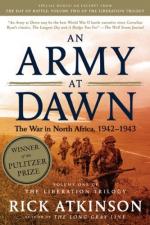
|
| Name: _________________________ | Period: ___________________ |
This test consists of 15 multiple choice questions and 5 short answer questions.
Multiple Choice Questions
1. Fredendall's orders to Ward titled "Defense of Faid Position" were based on a poor knowledge of the area and threatened what prospect for the Allied forces?
(a) To be marooned on two hills that were too far away from one another to offer any mutual support.
(b) Concentrate the forces in the lowest point of the valley where Axis fire could be concentrated.
(c) Allied forces would be stuck in a battle of attrition that could not be won given their size.
(d) Forces would be spread in a long line that would offer multiple weak spots that would be difficult to fill.
2. Which Kiwi General was known as "the salamander of the British empire," and called "Tiny" by his troops?
(a) Lieutenant General Bernard Freyberg.
(b) General Bernard Montgomery.
(c) General Harold Alexander.
(d) General Joseph Stillwell.
3. What was Fredendall's success in securing Faid Pass, Sened Station and Maknassy?
(a) In securing Maknassy and Sened Station both, but losing Faid Pass
(b) In securing all objectives.
(c) In securing no objectives.
(d) In securing Faid Pass but neither Sened Station or Maknassy.
4. How was SATIN a change in strategy for the Allies?
(a) It shifted the focus from a ground battle to an air and naval battle.
(b) It prioritized taking out Sicilian air bases and postponed the push for Tunis.
(c) It placed emphasis on tank battle and resulted in the issuance of thousands of bazookas.
(d) It changed the objective from capturing Bizerte & Tunis to destroying Rommel's army.
5. Which two passes did the Germans utilize in operation Fruhlingswind?
(a) Faid Pass and Maizila Pass.
(b) Maizila Pass and El Fekka Pass.
(c) Hatab Pass and Maizila Pass.
(d) Faid Pass and Bir el Hafey Pass.
6. Which state was disproportionately hit with casualties in the War in North Africa?
(a) New York.
(b) Michigan.
(c) Iowa.
(d) California.
7. What major engineering feat was undertaken in Speedy Valley, although it's strategic importance was questionable?
(a) An extensively camouflaged airway and underground bunker.
(b) A series of mobile bridge spans were prefabricated as rapid replacements for bridges Germans were expected to destroy in their retreat.
(c) The boring of a pair of immense, double-shafted tunnels to house the headquarters.
(d) The creating of a tank-proof moat surrounding the headquarters.
8. Who replaced Ward's command?
(a) Paul Robinett
(b) Ernie Pyle.
(c) Omar Bradley.
(d) Ernie Harmon.
9. Did morale improve in II Corps under Patten?
(a) Yes, in part for his reputation.
(b) No, his overbearing nature increased pessimism.
(c) Yes, but perhaps in spite of him.
(d) No, new regulations stifled morale.
10. Which high ranking American commander was captured in operation Furlingswind?
(a) Ted Roosevelt.
(b) John Waters.
(c) Kenneth Anderson.
(d) Terry Allen.
11. According to the author, how had Eisenhower been "outflanked" by the British in the Casablanca conference?
(a) A special envoy was forced upon him to assist with political matters.
(b) He was forced to relocate his operations office back to Gibralter where the British felt they could have better oversight.
(c) The position of a British general to oversee British and French troops was created, to be filled at a later date.
(d) His command structure was changed to put three British deputies, with independent authority, below him to oversee air, land and sea operations.
12. What two defects in planning for Longstop does the author point out?
(a) Expected tanks to take steep terrain and attacked with insufficient force.
(b) Underestimated the size of the enemy and misread the terrain.
(c) Used green troops and insufficient artillery.
(d) Placed artillery too distant for accuracy and turned down air support.
13. Who did Montgomery have a picture of above his desk?
(a) George Washington.
(b) Rommel.
(c) Churchill.
(d) Queen Victoria.
14. What strategic mistake did Fredendall make in regards to Faid Pass?
(a) Used half measures to counter attack there in order to focus on less strategically important battles.
(b) Ignored Anderson's order to 'make things right' there, even though it was a pass of little consequence.
(c) Issued orders of extreme complexity that confused the front.
(d) Delayed for two days which allowed German troops to dig in.
15. What criticism does the author make of Speedy Valley during the course of Furlingswind?
(a) That they believed their own misinformation.
(b) That the reluctance to acknowledge the route resulted in too many Allied deaths.
(c) That there was no sense of urgency.
(d) That panic reigned.
Short Answer Questions
1. What did Arnim do to undermine Rommel's attack on Le Kef and his designees on Tebessa?
2. In the start of Chapter 7, which traveler was listed as 'Register Number 1.'
3. What was operation SYMBOL?
4. Patton's II Corps had reached 88,473 men, the author notes that this is exactly the same size as what other American force?
5. Drake's command "Bust the Balloon," meant what:
|
This section contains 836 words (approx. 3 pages at 300 words per page) |

|




